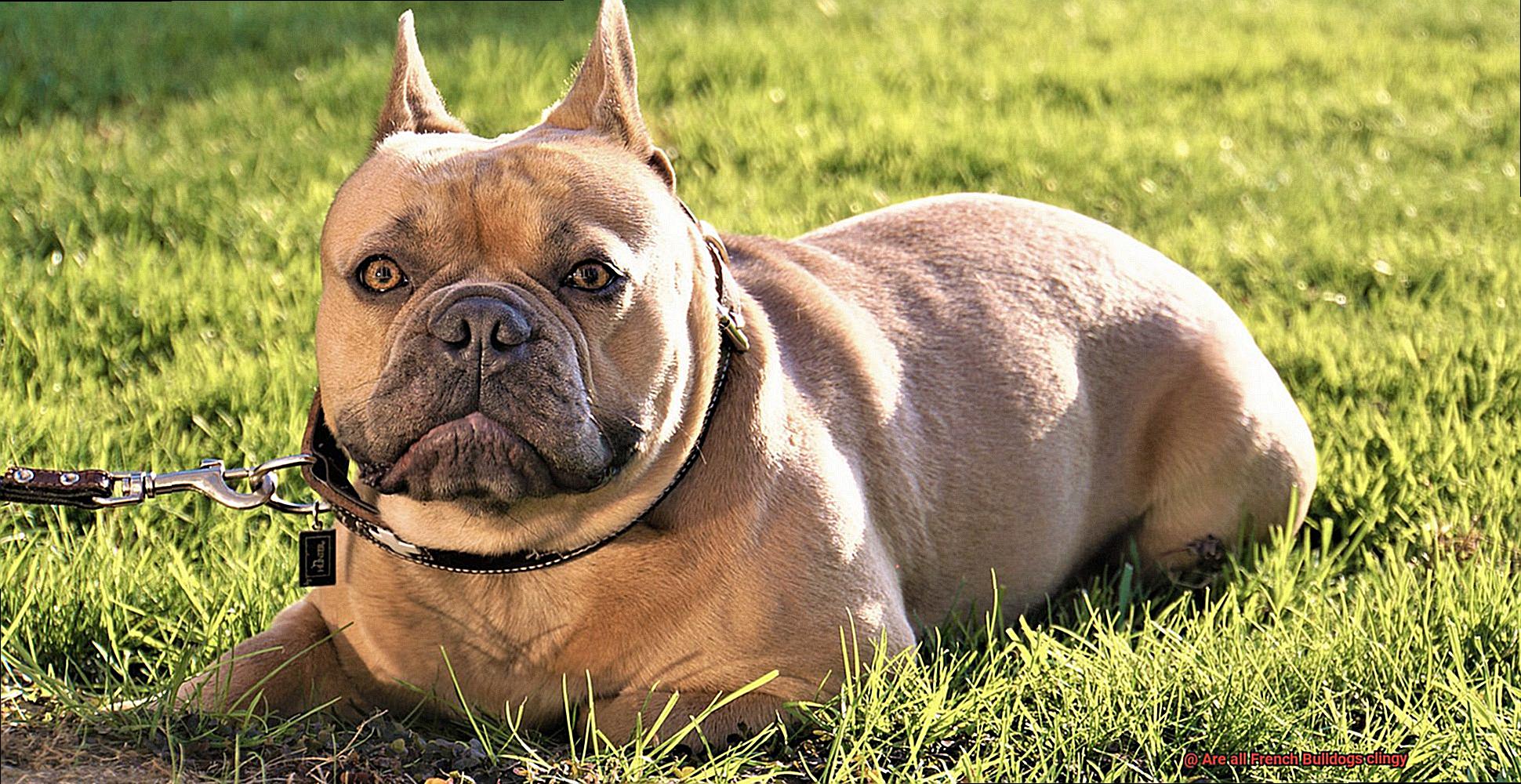Are all French Bulldogs clingy?
Think of a French Bulldog. What comes to mind? Perhaps an adorable furball with ears that could rival Batman’s and a compact body that just oozes charm. But beyond their undeniable cuteness, French Bulldogs often get labeled as “clingy.” They’re known for sticking close to their owners, following them around like furry shadows and refusing to let them out of sight.
But here’s the burning question: are all French Bulldogs truly clingy? As someone who knows a thing or two about canine behavior, I invite you on an eye-opening journey to uncover the truth behind this popular perception. Get ready to be amazed by what we discover about the nature of French Bulldogs, their unique personalities, and the factors that may influence their behavior.
Sure, many French Bulldogs do exhibit a certain level of attachment to their humans. But let’s not confuse healthy companionship with suffocating clinginess. It’s important to understand this distinction if we want to appreciate the deep bond these dogs form with their owners – it’s why they’ve earned the endearing nickname of “Velcro dogs.”

In our upcoming posts, we’ll dive into the nitty-gritty aspects of French Bulldogs’ attachment tendencies. We’ll explore their history, genetic predispositions, and how training and socialization can shape their behavior. Plus, we’ll dish out practical tips and advice on fostering a balanced and secure relationship with your French Bulldog while still honoring their independent spirit.
So get ready for an enlightening exploration into the psychology of French Bulldogs. Prepare yourself for some surprises as we challenge assumptions and gain a whole new level of understanding about these irresistible canines. Are all French Bulldogs truly clingy? Let’s find out together.
Understanding the Temperament of French Bulldogs
Contents
- 1 Understanding the Temperament of French Bulldogs
- 2 Factors That Influence Clinginess in French Bulldogs
- 3 The Loyal Nature of French Bulldogs and Separation Anxiety
- 4 Socialization to Reduce Clingy Behavior
- 5 Mental and Physical Stimulation for French Bulldogs
- 6 Establishing Boundaries to Promote Independence
- 7 Seeking Professional Guidance for Clingy Behavior
- 8 Conclusion
French Bulldogs have captured the hearts of many with their adorable looks and charming personalities. But what truly sets them apart from other breeds is their temperament.
In this comprehensive guide, we will delve into the world of French Bulldog temperament, exploring the factors that influence their behavior and how to foster a happy and well-adjusted companion.
Understanding the Individuality of French Bulldogs:
Just like humans, French Bulldogs have their own unique personalities. Some may be outgoing and sociable, while others may be more reserved and independent. Recognizing and respecting these individual differences is crucial in understanding their temperament.
The Role of Upbringing and Socialization:
Early socialization plays a vital role in shaping a French Bulldog’s behavior. By exposing them to various people, animals, and environments during their formative weeks, we can help them develop into confident and well-adjusted adults. Proper socialization can minimize clingy behavior and promote independence.
Genetics and Temperament:
While genetics can contribute to certain behavioral tendencies, it does not dictate a French Bulldog’s temperament entirely. Some dogs may have a predisposition towards clinginess, but not all French Bulldogs exhibit this behavior. It is essential to remember that each dog is an individual with their own unique blend of genetic traits.
Affectionate Nature and Clinginess:
French Bulldogs are renowned for their affectionate nature, which can sometimes be misconstrued as clinginess. Their deep attachment to their human companions often leads to them seeking constant attention and following their owners around. Understanding this bond is crucial in providing the right level of companionship.
Addressing Clinginess:
If your French Bulldog exhibits clingy behavior, there are steps you can take to promote independence without compromising their well-being. Establishing boundaries, encouraging alone time, and seeking professional guidance can help manage separation anxiety and foster a more balanced temperament.
Factors That Influence Clinginess in French Bulldogs
In this blog post, we will explore the various factors that can influence clinginess in French Bulldogs, helping you better understand and manage this behavior for a harmonious and balanced companionship.
Breed Characteristics:

French Bulldogs are known for their people-oriented nature and desire to be close to their owners. Their inherent need for attention and companionship can contribute to their clinginess. These dogs thrive on human interaction and often seek constant reassurance from their owners.
Socialization:
The level of socialization a French Bulldog receives during its early development stages plays a crucial role in determining its clinginess. Dogs that have been exposed to various people, animals, and environments tend to be more confident and independent. Conversely, those with limited socialization may develop clingy behaviors as they rely heavily on their owners for security.
Separation Anxiety:
Separation anxiety is a common issue among many dog breeds, including French Bulldogs. Dogs with separation anxiety become overly attached to their owners and exhibit distress when left alone. This can result in clingy behavior when the owner is present, as the dog constantly seeks reassurance and attention.
Owner’s Behavior:
The way an owner interacts with their French Bulldog can impact its clinginess. Inconsistent or unpredictable responses from the owner may lead to clingy behaviors, as the dog seeks stability and reassurance. On the other hand, providing clear boundaries and consistent training can help establish a balanced behavior in your furry companion.
Health Issues:
Certain health conditions can contribute to clinginess in French Bulldogs. Dogs experiencing discomfort or pain may seek constant proximity to their owners for comfort. Hormonal imbalances or underlying medical issues can also affect a dog’s behavior and increase clinginess.
Environmental Factors:
The environment in which a French Bulldog lives can influence its clinginess. Dogs confined to small spaces or lacking mental stimulation may become overly dependent on their owners for entertainment and companionship. Providing ample space, mental enrichment, and interactive toys can help alleviate clingy behaviors.

Previous Experiences:
Past experiences can shape a dog’s behavior, including clinginess. French Bulldogs that have been abandoned, neglected, or experienced traumatic events may develop clingy behaviors as a result of their past experiences. These dogs may fear being left alone again and constantly seek reassurance from their owners.
The Loyal Nature of French Bulldogs and Separation Anxiety
French Bulldogs are renowned for their loyal nature and strong bond with their owners. These little canines have a reputation for being “velcro dogs” because they love to stick by their owner’s side at all times. While this loyalty is endearing, it can sometimes lead to separation anxiety when their owners have to leave them alone.
Separation anxiety is a common issue among French Bulldogs and can manifest in various ways. Excessive barking, destructive behavior, and even self-harm are some of the ways this anxiety may present itself. As an owner, it is crucial to recognize the signs and take appropriate steps to address it.
One of the main reasons French Bulldogs are prone to separation anxiety is their strong attachment to their owners. They become so deeply bonded that being apart from them causes distress and anxiety. It’s important to understand that this behavior stems from their loyalty and not any inherent flaw in the dog’s character.
To help alleviate separation anxiety, gradual acclimation is key. Start by leaving your French Bulldog alone for short periods of time and gradually increase the duration. This helps them build confidence and trust that you will return. Providing toys, treats, and interactive puzzles can also help keep them occupied and reduce anxiety during your absence.
In severe cases of separation anxiety, seeking professional help from a veterinarian or a dog behaviorist may be necessary. These experts can provide guidance on training techniques, medications, or other interventions that may be beneficial for your furry friend.

Remember, dealing with separation anxiety requires patience and consistency. It may take time for your French Bulldog to overcome their fears, but with love, understanding, and proper training, you can help them feel more secure when left alone.
Socialization to Reduce Clingy Behavior
While their loyalty is endearing, clingy behavior can become problematic if it leads to separation anxiety or limits their independence. The good news is that socialization can be a game-changer when it comes to reducing clinginess in French Bulldogs. In this blog post, we’ll explore the importance of socialization and provide practical tips to help your furry friend become more confident and independent.

Start Early and Start Right:
The early weeks of a French Bulldog’s life are crucial for socialization. Introduce them to various environments, both indoors and outdoors, to help them become comfortable with different surroundings. Take them for short walks in the park, let them explore different surfaces, and expose them to everyday sounds like traffic or doorbells. This early exposure will build their confidence and reduce their reliance on you for security.
Mix and Mingle:
Humans aren’t the only ones your French Bulldog should get acquainted with. Introduce them to a wide range of people, from family members to friends and even strangers (with their consent, of course). Encourage gentle interactions and positive experiences to show your dog that it’s okay to seek attention from others. This will help reduce their clinginess towards you as their sole source of affection.

Playdates for Pawsome Playmates:
French Bulldogs are social creatures, and interacting with other dogs can work wonders in reducing clingy behavior. Arrange playdates with well-socialized dogs or consider enrolling in puppy playgroups or doggy daycare. These interactions will teach your Frenchie appropriate social skills and help them form friendships outside of their immediate human family.
Consistency is Key:
Socialization is an ongoing process that requires consistency. Gradually increase the complexity of socialization experiences as your dog becomes more confident. Start with quiet environments and gradually expose them to busier areas with more people and animals. Consistency will help your French Bulldog feel secure in various situations and reduce their clinginess.
Positive Reinforcement for Paw-sitive Results:

During socialization, use positive reinforcement techniques to reward your French Bulldog for independent behavior and confidence. Praise, treats, or playtime can be powerful motivators when they exhibit less clingy behavior. By associating positive experiences with being independent, your Frenchie will be encouraged to continue exploring the world with confidence.
Mental and Physical Stimulation for French Bulldogs
French Bulldogs are known for their affectionate and clingy nature. While this can be endearing, it’s important to provide them with the mental and physical stimulation they need to prevent behavioral issues and promote their overall well-being. In this expert analysis, we will explore the benefits of mental and physical stimulation for French Bulldogs, along with practical tips to keep your furry friend happy and balanced.
Mental Stimulation:
- Interactive Toys: Provide your Frenchie with interactive toys and puzzles that challenge their problem-solving skills. These toys, such as treat-dispensing ones or puzzle games, keep their minds active and engaged.
- Training Sessions: Regular training sessions not only keep your Frenchie mentally stimulated but also strengthen the bond between you and your dog. Use positive reinforcement techniques, rewards, and treats to make the training experience enjoyable for them.
Physical Stimulation:

- Regular Exercise: French Bulldogs need daily exercise to burn off excess energy and maintain a healthy weight. Aim for at least 30 minutes of exercise each day, but adjust according to your dog’s individual needs.
- Outdoor Activities: Engage in outdoor activities like walks, playtime, and agility courses. French Bulldogs enjoy playing fetch or chasing after squeaky toys. Swimming is also a great exercise option as it provides a low impact full-body workout.
- Indoor Exercises: When outdoor activities are not possible, engage your Frenchie in indoor exercises like hide-and-seek or using a laser pointer for them to chase. Ensure the environment is safe and free from hazards during these sessions.
Tailoring Stimulation to Your Frenchie:
It’s essential to observe your Frenchie’s behavior and adjust their stimulation routine accordingly. Some dogs may require more exercise and mental challenges, while others may be content with less. Finding the right balance will help keep your Frenchie happy and balanced.
Establishing Boundaries to Promote Independence
Establishing Boundaries to Promote Independence in French Bulldogs
French Bulldogs are adorable little creatures that love nothing more than being by their owner’s side. While their affectionate nature is endearing, it’s important to establish boundaries to promote independence in these dogs. In this section, we’ll explore some effective strategies for achieving this.
Consistent and Firm Training
Teaching your French Bulldog basic obedience commands like sit, stay, and come can help them understand their place in the household and promote independence. Consistency is key here – make sure everyone in the household is on the same page when it comes to training.
Mental and Physical Stimulation
French Bulldogs need plenty of mental and physical stimulation to prevent them from relying solely on their owners for entertainment. Engage them in regular exercise, playtime, and interactive toys to keep them occupied.
Clear Rules and Expectations
Setting clear rules and expectations is crucial. Make sure your French Bulldog knows what is allowed and what is not. For example, you may decide to not allow them on furniture or feed them only at designated times.
Crate Training

Crate training can be beneficial for promoting independence in French Bulldogs. By giving them a safe and comfortable space of their own, they can learn to be alone without feeling anxious or clingy.
Gradual Alone Time
Gradually increasing alone time can help your French Bulldog get accustomed to being alone and reduce separation anxiety. Start by leaving them alone for short periods and gradually extend the duration.

Socialization
Exposing your French Bulldog to different people, animals, and environments from an early age can build their confidence and reduce clinginess towards their owners.
Seeking Professional Guidance for Clingy Behavior
French Bulldogs are known for their affectionate and loving nature, but not all of them exhibit clingy behavior. Each dog is an individual with their own personality traits. However, if your French Bulldog is displaying clingy behavior, it is important to seek professional guidance to address the issue effectively. Here’s why:
- Determine the Underlying Cause: A veterinarian or animal behaviorist can help determine the underlying cause of your French Bulldog’s clingy behavior. It could be separation anxiety, lack of socialization, fear or insecurity, or simply a strong bond with their owner. Identifying the root cause is crucial in developing an appropriate strategy to manage or alleviate the clinginess.
- Rule Out Medical Issues: Professional guidance is essential in ruling out any medical issues that could be contributing to the clingy behavior. Consulting with a veterinarian ensures that there are no underlying health concerns causing your French Bulldog’s behavior.
- Training and Socialization: Working with a professional dog trainer can be immensely helpful in addressing clingy behavior. They can teach your French Bulldog independence and appropriate behaviors when left alone. Training techniques such as crate training, gradually increasing separation time, and positive reinforcement for calm and independent behavior can be effective in reducing clinginess.
- Mental Stimulation and Physical Exercise: Engaging in activities that promote mental stimulation and physical exercise can also help reduce clingy behavior. Puzzle toys, interactive play sessions, and regular walks or exercise routines can keep your French Bulldog mentally and physically stimulated, promoting independence and confidence.
- Consistent Routine and Secure Environment: Establishing a consistent routine and providing a secure and comfortable environment are crucial for addressing clingy behavior. Creating a safe space where your French Bulldog feels secure and has access to their basic needs is essential for them to develop independence.
ePdgri4-v8c” >
Conclusion
In conclusion, not all French Bulldogs are clingy. While they may have a reputation for their affectionate nature and desire to be by their owners’ side, it’s essential to differentiate between healthy companionship and suffocating clinginess. French Bulldogs are known as “Velcro dogs” because of the deep bonds they form with their humans, but that doesn’t mean every French Bulldog exhibits clingy behavior.
Just like humans, the temperament of a French Bulldog can vary from one individual to another. Some may be outgoing and sociable, while others may be more reserved and independent. Factors such as upbringing, socialization, genetics, and owner behavior can influence a French Bulldog’s tendency towards clinginess.
To shape a French Bulldog’s behavior, proper socialization during their early stages of life is crucial. Exposing them to various people, animals, and environments helps develop their confidence and independence. Additionally, addressing separation anxiety through gradual acclimation and seeking professional guidance can help manage clingy behavior.
To promote independence in French Bulldogs, it’s important to establish boundaries and provide mental and physical stimulation. Seeking professional guidance when needed is also key. Consistent training, clear rules and expectations, crate training, gradually increasing alone time, socializing with other dogs, engaging in mental enrichment activities, and maintaining a consistent routine can all contribute to reducing clinginess.
Remember that each French Bulldog has its own unique personality traits.




